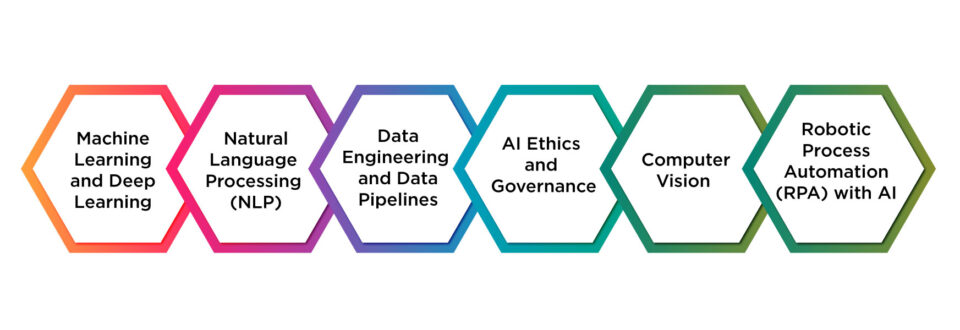Enterprise AI refers to the integration of artificial intelligence technologies like machine learning, natural language processing, and robotics into business operations to drive innovation, improve efficiency, and gain a competitive advantage. With the rapid evolution of AI, mastering these important skills is essential for businesses in 2024.
This blog discusses the meaning of enterprise AI and six important enterprise AI skills. Let’s begin!
What is Enterprise AI?
Artificial intelligence technology utilized by businesses to revolutionize their operations and obtain a competitive edge is referred to as enterprise AI. Machine learning, natural language processing, robotics, and computer vision systems are some examples of these AI technologies.
They are complex hardware and software that are challenging to use and that are developing quickly. Large amounts of high-quality data and specific expertise are also needed for enterprise AI applications.
However, there are significant risks involved in incorporating AI technology into current corporate systems and procedures, and it has been difficult to provide the criteria necessary to guarantee AI success. These challenges originate from the nature of corporate systems in general as well as the intricacy of the AI technologies themselves.
Traditional or innovative enterprise systems need to be scalable, reliable, secure, easy to incorporate into processes, and well-liked by staff members. AI expertise is costly and in short supply.
List of Enterprise AI Skills for 2024

1. Machine Learning and Deep Learning
Without explicit programming, robots may learn from data and make predictions thanks to machine learning (ML). It is the foundation of AI and is utilized in fraud detection and recommendation systems, among other applications. Neural networks created to mimic the structure of the human brain are used in deep learning (DL), a type of machine learning.
DL is quite good at jobs like speech and picture recognition. In today's data-driven world, organizations may automate processes, enhance customer experiences, and make more accurate forecasts by developing intelligent systems that can recognize patterns in massive datasets. This is made possible by understanding machine learning and deep learning.
2. Natural Language Processing (NLP)
Computers can grasp, interpret, and produce human language thanks to natural language processing, or NLP. It enables machines to handle enormous volumes of unstructured text or speech, powering products like chatbots, voice assistants, and translation services. NLP is essential for bridging the gap between machine understanding and human communication. It includes tasks like sentiment analysis, entity identification, and machine translation.
NLP may be used in business to help create content, evaluate client feedback, and automate customer support. NLP experts can create more intelligent, human-like interactions between users and AI systems, increasing operational effectiveness and consumer engagement.
3. Data Engineering and Data Pipelines
AI is based on data engineering, which collects, cleans, and arranges data for analysis or machine learning models. Preparing data for use in AI applications entails creating reliable data pipelines that effectively transfer data from unprocessed sources to databases or data lakes.
Incomplete, jumbled, or inconsistent data would be difficult for AI models to handle without appropriate data pipelines. To guarantee that data is handled precisely and swiftly, data engineers make use of solutions like Hadoop, Apache Spark, and cloud platforms. To train high-quality AI models and extract relevant insights, enterprises need strong data engineering capabilities.
4. AI Ethics and Governance
Making sure AI systems are developed and applied ethically is the main goal of AI ethics and governance. Addressing concerns, including bias, justice, privacy, and accountability, is essential given the growing dependence on AI. If AI systems are not properly controlled, they may unintentionally perpetuate preexisting prejudices, which can have negative consequences, particularly in delicate areas like criminal justice, healthcare, and recruiting.
AI ethics experts strive to develop frameworks that guarantee AI is applied fairly and openly. They promote trust and the ethical use of AI technology by assisting in making sure that AI systems abide by laws and are consistent with social norms.
5. Computer Vision
Machines can now analyze and grasp visual information from their surroundings thanks to computer vision, simulating human recognition of faces, objects, and patterns. It powers applications like automated quality control in manufacturing, facial recognition, and self-driving automobiles.
Computer vision systems can read handwritten language, identify items, and discover abnormalities by analyzing picture or video data. Computer vision helps organizations automate processes, increase accuracy, and cut expenses. Computer vision experts may develop systems that derive valuable information from visual data, revolutionizing sectors like retail, security, and healthcare with creative solutions.
6. Robotic Process Automation (RPA) with AI
Data input and transaction processing are two examples of repetitive, rule-based processes that robotic process automation (RPA) performs. RPA gains strength when paired with AI since it makes it possible to automate processes that call for judgment or flexibility.
Complex tasks like processing invoices, detecting fraud, and answering customer service inquiries may be handled by AI-powered RPA, which can learn from previous encounters and get better over time.
Businesses may enhance productivity, decrease mistakes, and cut expenses by automating both basic and complex processes. Experts who can combine RPA and AI will assist businesses in streamlining processes and promoting digital transformation in a variety of sectors.
Conclusion
As AI continues to reshape industries, mastering key skills such as machine learning, NLP, and AI ethics is crucial for businesses to thrive. By embracing these technologies, organizations can automate processes, improve decision-making, and foster innovation, positioning themselves for success in an increasingly data-driven world.
We did everything we could to help our readers understand the enterprise AI idea in our blog. We are confident that this information will broaden your current understanding.
Continue visiting WisdomPlexus for more tech-savvy content.
You May Also Like to Read:
Here are the Benefits and Examples of Enterprise Service Management




